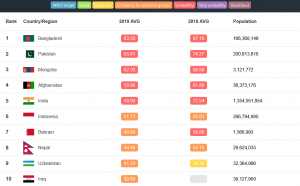Hey, welcome back! Last week, Dr Coleman shared the concept of “air inequality” in her lesson. I found the topic rather intriguing and thus, decided to do further research. This week, I am going to share my findings.
Air is a common resource that everyone shares, yet, “good” quality air is not equally distributed. Based on the WHO’s report, 9 in 10 people live in places that do not meet the WHO’s recommended standards for PM2.5 levels. In 2019, only 18 countries met the standards for “good” air quality(In terms of PM2.5 levels). Majority of the rest had moderate air quality, and lower-income nations tend to have the worst air quality.

Within the affected nations with poor air quality, some of the less privileged groups of people seemed to be disproportionately affected.
In the USA, minority groups have a greater vulnerability to air pollution, despite contributing less to it. The minorities in the USA tend to have lower income. With lesser buying power, they have greater difficulty coping with the impacts of poor air quality.
In countries that still use biofuel for cooking, such as India, women and children are disproportionally affected by poor air quality. The use of biofuels during cooking produces substantial amounts of indoor pollutants. As women and children are more likely to stay at home, they have increased risks of inhaling the pollutants. A study found that the amount of carbon monoxide found in the lungs of affected women and children is equivalent to “smoking 7 cigarettes per day”. The increased exposure to indoor pollution increases the rates of premature death and respiratory diseases.
The most vulnerable often lack the capacity to adequately protect themselves. This issue cannot be addressed by asking those affected to “increase their income”, or “use less ‘polluting’ fuel”. Existing social challenges act as a barrier that hinders their ability to improve their situation. It takes a tremendous amount of time and effort to provide necessary aid to deal with the inequalities. For example, to use modern, less polluting fuel for cooking, existing infrastructure has to first be improved. The building of gas pipes, the upgrading of stoves, are not procedures that is accessible to all.
To increase the income of the minority, existing social beliefs and stigma have to change. In the USA, the average black man makes less money than their white counterparts, despite holding similar qualification and work positions.
Social inequality is a catalyst that exacerbates air inequality.
Air inequality is ultimately a mere symptom of the complex, deep-rooted existing social inequality. Due to being in disadvantaged situations, the vulnerable lack the resources and knowledge to break out of their predicament. To improve the situation, the existing social inequality must first be dealt with. Admittedly, this is not an easy task to resolve, else inequality will no longer be an issue today.
I hope you took away something after reading my blog. See you next week!
Hi Jian Xi,
You don’t have to answer what I’m about to say, but I invite you to think deeply. Especially to read the article on the link between wealth & deforestation that I recommended on LumiNUS the other day.
You are a citizen of one of the world’s wealthiest nations. A nation that amassed a significant portion of its wealth via investment in shipping (and all the practices that go along with that) – an economic activity that is tremendously polluting.
If you could go backward in time, would you prefer not to see LKY’s vision of SG as an int’l shipping hub not be realised knowing that your lifestyle might not be what it is today ?
I think this issue – what is each of us willing to sacrifice to reduce inequality and who should sacrifice the most – is a very deep conversation that might need to become louder. What do you think ?
jc
Hi Dr Coleman,
thank you for your question! For me, I view the problem of inequality as a tipped scale, with the heavier side being the less privileged, weigh down by reasons for inequality. The only way to balance it is for the “units” of inequality to be removed. The solution is of course not as simple as that. Firstly, inequality is multifaceted and non-quantifiable. Even with much effort, it does not just get removed as inequality will always exist in some form. Secondly, even if the privileged “sacrifice” more, it is merely addressing the symptoms of inequality and does nothing to remove the root cause of it. Lastly. I believe that the desire to obtain the best standard of life is basic human nature. To sacrifice one’s privilege to help another is not something everyone is willing to do. At the end of the day, the less privileged still get the shorter end of the stick and end up sacrificing the most, even if they should not have to.
– Jian Xi
What a deep and interesting reply !
Maybe I’m too much of an idealist in some ways.
To the point that I sometimes have almost Robin-Hood-esque fantasies, essentially involving removing the fortunes of people like Jeff Bezos and Jack Ma, etc. and redistributing the funds equitably so that all can have enough to survive.
That said, I would love to hear your thoughts (not necessarily in writing – you could invite me for tea 🙂 about the root causes of inequality, as you put it.